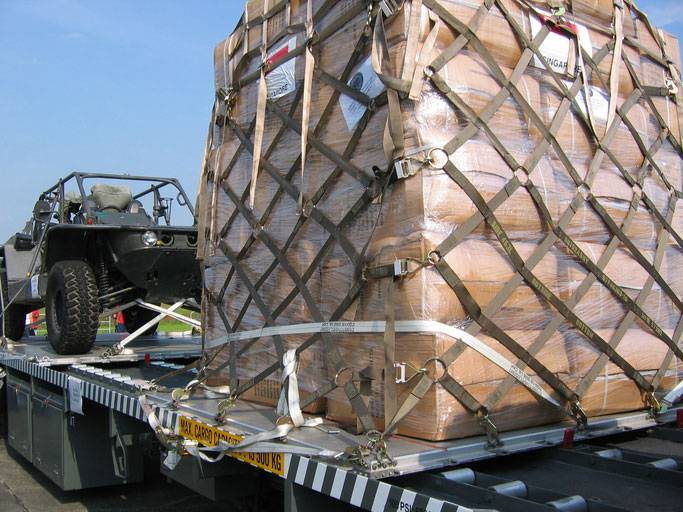
The appearance of U.S. Department of Defense (DoD) visual information does not imply or constitute DoD endorsement.
Amateurs talk tactics. Professionals study logistics.
Featured Programs:Sponsored School(s)~ General of the Army Omar Bradley
The American military is the most professional force on the planet. And much of that comes down to having mastery of logistics and supply.
The American military was becoming an expert in trans-continental supply chain management while the private sector was still getting out of bed. Sending and supplying tens of millions of friendly soldiers around the globe during World War II, from the Aleutian Islands to the deserts of Egypt to the jungles of Guadalcanal was a feat of logistical prowess still studied today.
There are few other organizations on the globe with as much real-world experience and expertise in creating and hardening supply chains as the Pentagon.
Is it any surprise that one of the most recognized names in logistics today, FedEx, was founded by Marine veteran Fred Smith?
A military job in logistics and support gives you a front-row seat into how that magic happens. You’ll learn from the best, and get training and experience at a level that few civilian organizations could offer.
With that expertise and the educational benefits that come both during and after your service, you’ll be set for a job in supply chain management.
Explore Your Military Training and Degree Options
Getting Items From Point A To Point B Is the Most Critical Military Specialty
 Supply chain management is only one component of the larger art of logistics. But it’s one that has special significance that is shared in both the military and civilian worlds.
Supply chain management is only one component of the larger art of logistics. But it’s one that has special significance that is shared in both the military and civilian worlds.
For private corporations, non-profits, or government agencies, modern supply chains support sophisticated manufacturing or service operations. Something as simple as a roll of toilet paper has a surprisingly long and sophisticated string of resources, packaging, and processing required before it ends up on a roller next to a toilet… something that many Americans learned the hard way during the COVID-19 pandemic.
Running out of TP or any other must-have item in business is a pretty bad outcome, but it’s not nearly as bad as running out of ammunition, food, or fuel in a fight.
Feats like the famed Red Ball Express, which employed more than 6,000 trucks to shift 12,000 tons of supplies daily between the Normandy beachheads and the front lines, are what makes military logistics legendary.
So, if you have a background in military supply chain management from any service, you already have a leg up when it comes to jobs in the civilian world.
In an Interconnected World, Supply Chain Jobs Are King
 Supply chain managers coordinate the procurement, delivery, storage, and distribution of various goods and resources required to keep a company operating.
Supply chain managers coordinate the procurement, delivery, storage, and distribution of various goods and resources required to keep a company operating.
The distributed, multinational nature of modern enterprise procurement strategy guarantees that supply chain managers will be key to doing business for the foreseeable future.
This involves a lot of time both on the phone and in front of a computer. Supply chain managers work with both internal supply chains and with outside suppliers. Increasingly, that includes coordination overseas, with professionals in different time zones and speaking different languages… a lot like when an Air Force logistics specialist tries to have a conversation with a Marine, for instance.
Supply chain managers may be responsible for quality assurance and inventory. Their biggest talent may be the one that both your military background and a college degree will prepare you for: problem-solving. Snarls in supply chains are part of the job, and untangling them is maybe the most critical role a supply chain manager can play.
Supply Chain Management Professionals Traffic in Serious Salaries
 Although you will find plenty of jobs out there with the “Supply Chain Manager” title, the Bureau of Labor Statistics (BLS), which tracks American employment and salary data, doesn’t keep a specific listing for that position.
Although you will find plenty of jobs out there with the “Supply Chain Manager” title, the Bureau of Labor Statistics (BLS), which tracks American employment and salary data, doesn’t keep a specific listing for that position.
Instead, they put most supply chain professionals into the category of logisticians. For 2021, the median annual salary for logistics jobs came to $77,030.
But logistics demands vary by industry, so you will find quite a range of salaries depending on what area you specialize in. The top industries of employment for the field, for example, offered the following average pay:
- Federal government - $88,710
- Management of companies and enterprises - $78,660
- Manufacturing - $77,740
- Professional, scientific, and technical services - $76,840
- Wholesale trade - $63,930
The top ten percent of all logisticians earned more than $122,390 in 2021.
And there are also a number of related fields where you can put a degree and military expertise in supply chain management to good work:
- Industrial Production Managers - $103,150
- Management Analysts - $93,000
- Operations Research Analysts - $82,360
You Won’t Have Any Trouble Finding a Military Logistics MOS
How can you get military experience to turn into one of these high-paying civilian positions? Well, to start with, you’ll want a Military Occupational Specialty (MOS) and a billet in a logistics organization in the service. Fortunately, those aren’t hard to find. Every branch of the military has a large, and dedicated, component that focuses entirely on supply chains.
- Army - Logistics Corps has MOS numbers in the 88 and 92 series that focus on supply and transportation.
- Navy - The Naval Supply Systems Command handles the tough job of keeping ships and subs supplied around the globe; the Logistics Specialist rating and designated staff officers manage the command.
- Air Force - Career group 2, Logistics and Maintenance, includes roles like 2F Fuels, 2G Logistics Plans, and 2S Material Management
- Marine Corps - The Marines have several occupational fields that handle their complicated air and sea supply chains, including 04 Logistics, 30 Supply Chains Management, and 31 Distribution Management.
- Coast Guard - The Storekeeper rating handles supply and logistics considerations for Coast Guard ships and installations.
Space Force logistics are sure to present some new and fascinating challenges, but for now, the Air Force handles all Space Force supply chain requirements.
Supply chains also come into play for units that handle acquisitions and procurement. There are significant strategic considerations that go into supply chain management in defense industries. This means you can also get solid training in roles such as those with the Army’s Acquisition Corps, with 51 range MOS numbers or in the Air Force’s career group 6, Acquisition.
No Expense Is Spared in Military Logistics Training
 Of course, each of these specialties has their own unique training. Right after Basic, for example, the Army’s 92A Automated Logistics Specialist is sent off for 9 weeks of Advanced Individual Training at the Army’s Quartermaster School in Fort Lee, Virginia.
Of course, each of these specialties has their own unique training. Right after Basic, for example, the Army’s 92A Automated Logistics Specialist is sent off for 9 weeks of Advanced Individual Training at the Army’s Quartermaster School in Fort Lee, Virginia.
This training will usually give you an overview of supply chain operations as well as your specific logistics duties. But as you advance in rank and responsibility, many more training options will open up. That 92A, for example, will likely be sent on to study the Army’s Global Combat Support System, a web-based program from the Department of Defense (DoD) that tracks all kind of supply, logistics, and finance data.
For officers, there are even more advanced training options. In some cases, this can include actual master’s degrees offered by military-run universities such as:
Defense Acquisition University – DAU is a DoD-operated college that offers training and certification in all areas of procurement, including logistics studies. DAU is one of the military-run universities that is most accessible to senior enlisted personnel as well as officers.
National Defense University – Also run by DoD, NDU offers a range of master’s degrees in areas of strategic interest. The Dwight D. Eisenhower School for National Security and Research Strategy is the NDU college that covers logistics and acquisitions, offering a Master of Science in National Resource Strategy.
Naval Postgraduate School – NPS’ Graduate School of Defense Management includes studies in both acquisition and logistics as part of their master’s programs in Operations Research and Department of Defense Management.
Air Force Institute of Technology – AFIT’s School of Systems and Logistics has a wide range of logistics coursework, often with an air supply chain focus, offering a unique kind of training with many civilian applications.
In addition to these logistics-focused programs, pretty much every service’s war college has coursework in logistics and supply chain management as part of their master’s programs in strategic studies.
What the Enemy Taught Us About Supply Chain Management in Vietnam
 The American mastery of logistics is part of how the Allies won the Second World War. Shipping huge volumes of supplies and equipment around the world, from Russia to Australia, made victory on two fronts possible.
The American mastery of logistics is part of how the Allies won the Second World War. Shipping huge volumes of supplies and equipment around the world, from Russia to Australia, made victory on two fronts possible.
But in Vietnam, American logisticians met their match on the jungle paths of the Ho Chi Minh trail.
While U.S. supply chains came in via high-tech jets or bulk cargo freighters carrying everything from artillery shells to beer, the North Vietnamese Army (NVA) was sending their supplies down rutted trails, across rivers, and through jungles on foot, on ox carts, or by bicycle.
Through the most intensive air interdiction campaign in history, the Vietnamese hauled food, ammunition, missiles, and even entire disassembled artillery pieces south across the DMZ to support the operations of the Viet Long. Although unorthodox, it was effective—the most critical feature of any supply chain.
Ultimately, the North Vietnamese took possession of the entire country and remain there today, while the Americans went home. It was a valuable lesson for American logisticians. The adaptability and initiative shown by the NVA is still taught in supply chain management classes.
In some cases, the military might send you out to a civilian college for graduate studies in supply chain management as well. Again, this is almost always an option exclusively available to officers, who must hold a bachelor’s degree to become commissioned. But it offers stunning value in education: your entire assignment is to earn that degree. Tuition and fees are all paid for, and you continue to collect all your regular military pay and benefits, including housing.
COOL Can Help You Earn Supply Chain Certifications While Still in the Service
 A program that anyone can take advantage of, both officer and enlisted personnel, is COOL: Credentialing Opportunities On-Line. COOL is a DoD database of various industry licenses and certifications together with the MOS codes they may be applicable to. COOL both points you in the right direction to get these certs, and offers up to $4,000 toward any coursework or exam fees it may take to get them.
A program that anyone can take advantage of, both officer and enlisted personnel, is COOL: Credentialing Opportunities On-Line. COOL is a DoD database of various industry licenses and certifications together with the MOS codes they may be applicable to. COOL both points you in the right direction to get these certs, and offers up to $4,000 toward any coursework or exam fees it may take to get them.
For supply chain management specialists, this can help you get important qualifications in the field before you are even discharged, including:
- Certified Hazardous Materials Manager
- Certified Manufacturing Technologist
- Certified Association Executive
You must get the approval of your leadership to use COOL, but in most cases, they are going to be supportive of anything that helps you do your job better.
A Degree in Supply Chain Management Rounds Out Military Training in Logistics
 Military training in supply chain management is a great start to a career in the field, but it has a very specific focus. Convoy defense is not generally a topic that comes up a lot in civilian supply chain circles. Your expertise in planning and organizing night-time C-130 supply drops in the face of determined enemy air defenses probably isn’t going to be called on.
Military training in supply chain management is a great start to a career in the field, but it has a very specific focus. Convoy defense is not generally a topic that comes up a lot in civilian supply chain circles. Your expertise in planning and organizing night-time C-130 supply drops in the face of determined enemy air defenses probably isn’t going to be called on.
While there are many concepts and skills that translate from military logistics to private-sector supply chain management, you’ll need a degree to make a successful transition.
You’ll find degrees in supply chain management at every level of college:
Associate degrees are basic two-year programs that offer entry-level training in key logistics concepts and management technologies. They can get you a foot in the door or serve as transfer programs to count as the first two years of a full bachelor’s program.
Bachelor’s degrees are the four-year programs that are considered the baseline in this field. You get a more complete and detailed picture of supply chain processes and concepts together with the critical-thinking and general knowledge coursework to make you a management-grade logistics professional.
Master’s degrees put you through another intensive three years of study that equip you with the expertise for senior management and executive positions.
Doctoral degrees, or PhD’s in Supply Chain Management, are mostly aimed at preparing professors or high-level researchers in the field. They can take five years or more to earn.
Particularly in advanced degrees, you’ll also find supply chain management as a concentration in related fields, such as business or business operations degrees. You’ll also find them called logistics and supply chain management, or just logistics. The higher level of degree you earn, the more likely you are to end up as a manager or supervisor.
Supply Chain Management Curriculum Covers All the Logistics Bases
The coursework you study in a supply chain management degree will fill in a lot of the gaps between civilian supply chain practices and what you have already learned in the military.
Information Systems – The internet and computerized record keeping revolutionized supply chain processes. You’ll spend time getting familiar with both the theory and hands-on details of various logistics management packages.
Economics and Accounting – Accounting is a key part of supply chain management. Economics, however, are what prop up the entire concept of a supply chain. When the economics don’t make sense, neither does the supply chain. You’ll have classes that ground you in micro- and macroeconomics to give you the basis for analysis you’ll need as a supply chain manager.
Business Strategy and Management – Supply chains are enablers of larger strategic plans that businesses put in place. This means you will receive training in general business management techniques and strategic planning concepts.
Procurement – Although some supply chains are internal to a company, in most cases they are intimately tied to outside suppliers. Learning about procurement processes and negotiation prepares you for dealing with these companies and understanding their impact on your own resources.
Transportation Systems – No, you won’t be studying how many troops and equipment you can stuff into the back of a Stryker, but you will learn a lot about counting TEUs (twenty-foot equivalent units, the standard measure of shipping containers) and how those cans that hold everything from shampoo to sides of beef are shuffled around the globe. Costs, capacity, and timeliness are all factors in the selection of shipping systems, and you will need to know them by heart.
Business Processes – Supply chains only work when they are plugged in to the other elements that make a business work: staffing, ordering, invoicing, payments, and more. Taken together, these are business processes, and business process automation is how shipping management gains efficiency.
Particularly at the associate’s and bachelor’s levels, you’ll also have plenty of coursework in general studies fields like math, science, and social studies. These may not seem directly related to supply chain management, but they will build your key communications and problem-solving skills that will get used every day on the job as a supply chain manager.
Selecting a Military-Supportive School for Your Supply Chain Management Degree
 You have a solid background in military logistics and supply chain practices; you know what kind of degree you need to polish that experience up. What’s next? Picking a military-supportive school to earn that degree at.
You have a solid background in military logistics and supply chain practices; you know what kind of degree you need to polish that experience up. What’s next? Picking a military-supportive school to earn that degree at.
What’s a military-supportive school, though? There’s no official definition. But it starts with accepting GI Bill® benefits, which are going to be the largest educational benefit that most veterans receive. Paying for 36 months of tuition and fees, in most cases, it will cover the entire amount of in-state public school rates. You also get a book and supply stipend and a monthly housing allowance at an E-5 equivalent rate. In some cases, you could qualify for relocation assistance, too.
Many schools go further, however. What if you want to attend a private school, or don’t qualify for in-state tuition? Truly military-supportive schools also participate in the Yellow Ribbon program. Through Yellow Ribbon, a college commits to providing tuition money to a select number of veterans to cover any costs over and above what the GI Bill® takes care of. With a match from the VA, that’s almost always enough to cover tuition at even the most elite institutions, anywhere in the country.
You can find schools with these qualifications through the VA’s GI Bill® Comparison Tool, on their website. It will also clue you in to other important military friendly policies, like:
- Offering college credits for military training or experience
- Providing dedicated academic advising services for veterans
- Hosting veteran’s groups and counseling services on campus
- Offering preferential admissions and class enrollment to vets
Different schools may have different combinations of those features, or other advantages that matter to you even more. But the Comparison Tool will break it all down, by area or school name, and give you points of contact to learn more.
There’s No Logistics Problem So Tough an American Veteran Can’t Solve It
 Coming from a military background in supply chain management gives you some other key advantages that fall outside the regular college curriculum. Logistics work in the service comes with an urgency and sense of mission that few of your classmates will ever have experienced.
Coming from a military background in supply chain management gives you some other key advantages that fall outside the regular college curriculum. Logistics work in the service comes with an urgency and sense of mission that few of your classmates will ever have experienced.
And your general military training and experience gives you qualities that not many other people will have. During the course of your career, you will have picked up a bunch of other skills and qualities that employers salivate over:
- Timeliness and dependability
- Integrity and adaptability
- Communication skills and the ability to work as part of a team
Those are all critical intangibles that any company would appreciate seeing in job candidates. Those skills in addition to your advanced training in supply chains, along with a degree earned through your veterans’ benefits, is sure to make you a competitive candidate.
2021 US Bureau of Labor Statistics salary and employment figures for Logisticians, Industrial Production Managers, Management Analysts, and Operations Research Analysts reflect national data, not school-specific information. Conditions in your area may vary. Data accessed June 2022.





